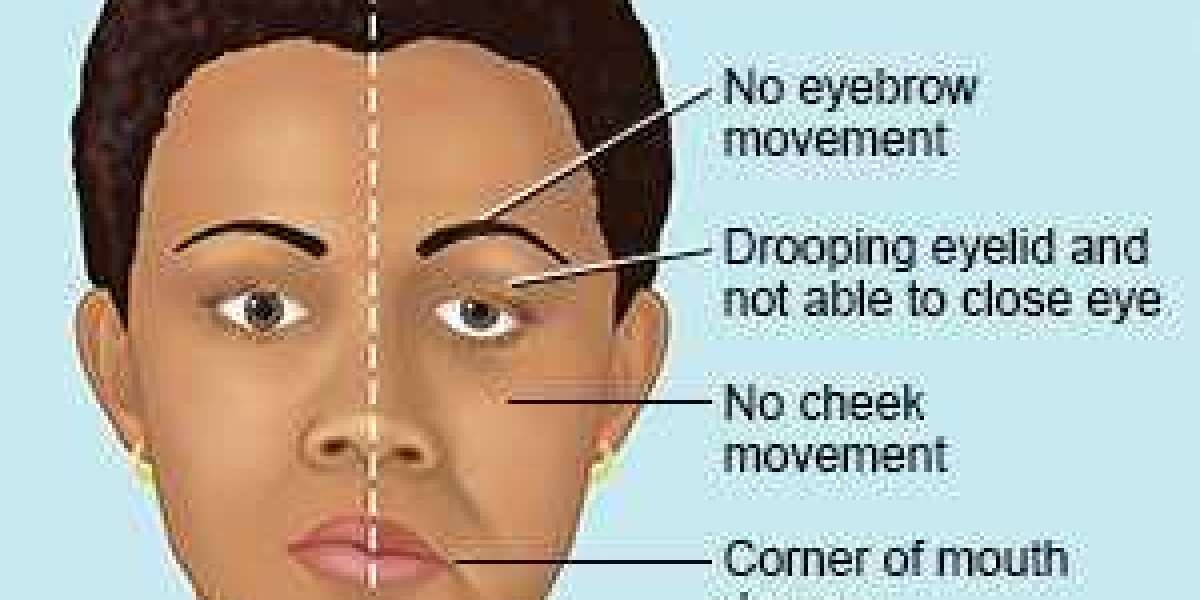Bell's palsy is a sudden, temporary weakness or paralysis of the facial muscles on one side of the face. The condition is named after Sir Charles Bell, a Scottish surgeon who first described it in the early 19th century. It is the most common cause of facial paralysis, accounting for about 60% to 75% of all cases.
Symptoms of Bell's Palsy
The symptoms of Bell's palsy can develop suddenly and worsen over a period of 24 to 48 hours.
The most common symptoms include:
- Facial droop or weakness on one side of the face
- Difficulty smiling or making facial expressions
- Drooling or difficulty with eating or drinking
- Loss of taste sensation on the front two-thirds of the tongue
- Dryness or watering of the eye on the affected side
- Increased sensitivity to sound on the affected side
- Pain or discomfort behind the ear on the affected side
- Headache or neck pain
Causes of Bell's Palsy
The exact cause of Bell's palsy is not known, but it is thought to be the result of swelling and inflammation of the facial nerve that controls the muscles of the face.
Several factors may contribute to the development of Bell's palsy, including:
Viral infection: Most cases of Bell's palsy are thought to be caused by a viral infection, such as herpes simplex virus (HSV), which causes cold sores.
Immune system disorders: Some cases of Bell's palsy may be due to an autoimmune reaction, where the body's immune system attacks its own tissues.
Physical trauma: Injury to the facial nerve can cause temporary or permanent paralysis of the muscles on one side of the face.
Pregnancy: Pregnant women may be at a higher risk of developing Bell's palsy, although the reasons for this are not well understood.
Diagnosis of Bell's Palsy
The diagnosis of Bell's palsy is typically based on the symptoms and a physical examination. The doctor will ask about the onset and progression of the symptoms, as well as any previous medical conditions or treatments. They will also examine the face and perform some simple tests to evaluate facial nerve function.
The physical examination will include an assessment of the patient's ability to close the eye on the affected side, raise the eyebrow, smile, and show the teeth. The doctor will also look for other signs of facial nerve dysfunction such as drooping of the corner of the mouth, asymmetry of the face at rest, and difficulty with speech or swallowing.
Additional tests may be recommended to rule out other possible causes of facial weakness or paralysis. These may include blood tests to check for infections or other conditions, imaging tests such as an MRI or CT scan to look for structural abnormalities or other underlying causes, and nerve conduction studies or electromyography (EMG) to evaluate nerve function and detect any abnormalities.
It is important to seek medical attention promptly if you experience sudden facial weakness or paralysis, as there are other conditions that can cause similar symptoms and may require different treatment approaches. These include stroke, brain tumors, Lyme disease, and other infections or injuries affecting the facial nerve or brain.
In some cases, a referral to a specialist such as a neurologist or an otolaryngologist may be recommended for further evaluation and management. Treatment options for Bell's palsy may include medications, eye care, and facial exercises or physical therapy to help speed up recovery and improve function.
Treatment of Bell's Palsy
Most people with Bell's palsy recover fully within a few weeks or months without treatment. However, some treatments may be recommended to help speed up recovery and relieve symptoms.
These may include:
Corticosteroids: These drugs, such as prednisone, are used to reduce inflammation and swelling in the facial nerve and may help speed up recovery. Treatment should be started within 72 hours of the onset of symptoms to be the most effective.
Antiviral medications: If a viral infection is suspected as the cause of Bell's palsy, antiviral medications such as acyclovir may be prescribed.
Eye care: People with Bell's palsy may have difficulty closing their eyes on the affected side, which can lead to dryness, irritation, and infection. Artificial tears or lubricating ointments may be recommended to prevent these complications.
Facial exercises: Specific exercises to help strengthen and retrain the facial muscles may be recommended to help speed up recovery and improve facial function.
Prognosis
Most people with Bell's palsy recover fully within three to six months, although some may have persistent weakness or other complications. The prognosis is generally better for younger people and those with milder symptoms. In some cases, however, facial weakness or paralysis may be permanent.
Common Questions and Answers
Q: Is Bell's palsy contagious? A: No, Bell's palsy is not contagious. It is not caused by an infection that can be passed from person to person.
Q: Can Bell's palsy affect both sides of the face? A: It is rare, but Bell's palsy can affect both sides of the face simultaneously or at different times.
Q: Can stress cause Bell's palsy? A: Stress may be a contributing factor to the development of Bell's palsy, but it is not the sole cause. The exact cause of Bell's palsy is not well understood, but it is thought to be due to a combination of factors such as viral infections, immune system disorders, and physical trauma.
Q: Is there a cure for Bell's palsy? A: While there is no specific cure for Bell's palsy, most people with the condition recover fully within a few weeks or months without treatment. Some treatments may be recommended to help speed up recovery and relieve symptoms.
Q: How long does it take to recover from Bell's palsy? A: Most people with Bell's palsy recover fully within three to six months, although some may have persistent weakness or other complications.
Q: Can Bell's palsy affect children? A: Yes, Bell's palsy can affect children, although it is more common in adults.
Q: Can Bell's palsy cause permanent damage? A: In most cases, Bell's palsy does not cause permanent damage, and most people recover fully. However, in some cases, facial weakness or paralysis may be permanent.
Q: How is Bell's palsy different from a stroke? A: Bell's palsy is caused by inflammation or swelling of the facial nerve, whereas a stroke is caused by a disruption of blood flow to the brain. In Bell's palsy, weakness or paralysis is limited to the face, while in a stroke, weakness or paralysis can affect other parts of the body as well.
Q: Can Bell's palsy cause other complications? A: In rare cases, Bell's palsy can cause other complications such as permanent facial weakness, hearing loss, or problems with taste.
Q: How is Bell's palsy diagnosed? A: Bell's palsy is typically diagnosed based on the symptoms and a physical exam. Additional tests such as blood tests or imaging tests may be recommended to rule out other possible causes of facial weakness or paralysis.
Q: What are the treatment options for Bell's palsy? A: While most people with Bell's palsy recover fully without treatment, some treatments may be recommended to help speed up recovery and relieve symptoms. These may include medications, eye care, and facial exercises, or physical therapy.
Q: Can I prevent Bell's palsy? A: There is no surefire way to prevent Bell's palsy, but taking steps to maintain a healthy immune system, avoiding exposure to viruses or infections, and managing stress may help reduce the risk.
Q: Can I drive with Bell's palsy? A: Depending on the severity of the symptoms, driving may be difficult or unsafe with Bell's palsy. It is important to consult with a healthcare provider and follow their recommendations regarding driving or other activities that may be affected by the condition.
Q: Can I work with Bell's palsy? A: Depending on the severity of the symptoms, work may be difficult or impossible with Bell's palsy. It is important to consult with a healthcare provider and follow their recommendations regarding work or other activities that may be affected by the condition.
Q: Are there any long-term effects of Bell's palsy? A: In most cases, Bell's palsy does not cause long-term effects or complications. However, in rare cases, permanent facial weakness or other complications may occur.
Conclusion
Bell's palsy is a common condition that causes temporary weakness or paralysis of the facial muscles on one side of the face. While the exact cause is not known, most cases are thought to be due to a viral infection or inflammation of the facial nerve. Most people with Bell's palsy recover fully within a few weeks or months without treatment, but some may benefit from medications, eye care, and facial exercises to help speed up recovery and improve function. It is important to seek medical attention if you experience sudden facial weakness or paralysis to rule out other possible causes and receive appropriate treatment. With proper care and management, most people with Bell's palsy can expect a full recovery and return to their normal activities.



Emmanuel Frank 1 kamu
Amazing